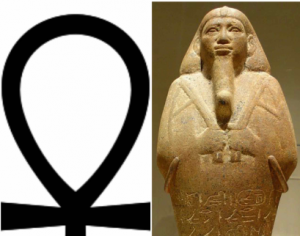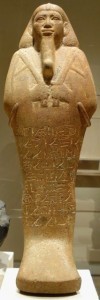Recently, an artifact found in Mexico was confirmed to be an Ancient Egyptian Ushabti figurine.
Shabab Abdel-Gawad, the leader of the Egyptian Antiquities Repatriation Department, shared his great news with Ahram Online. The statuette was recently found by a resident of Mexico at his new house. Realising the importance of the find, he handed over the little statue to the Egyptian embassy located in Mexico.
(Ushabti figure)
After the statue found its way back home to Egypt, it was carefully analysed by a committee of archaeologists in the Egyptian museum in Tahrir. The head of the team says the statue goes back to the 19th dynasty. It is speculated to have been illegally smuggled out of the country.
The statue was carved from wood and has been engraved with hieroglyphics meaning “honest man”. The artifact has luckily been recovered after being gone from home for far too long.
Another object was discovered in Toluca that is shockingly similar to the Ankh that originated in ancient Egypt. The Ankh represented eternal life and is believed to have been one of the most famous and important aspects of ancient Egyptian culture.
Even though experts understand the meaning of the hieroglyphics, the true meaning and origin of the symbols is still a giant mystery. There are tons of theories behind the meaning of “ankh” but none have been accepted as fully true. Ankh has been featured in tombs and other important pieces of art. It’s typically found at the fingertips of Egypt’s most important gods of the ancient culture’s afterlife.
(Ankh)
This same symbol shows up often in Minoan and Mycenaean sites. It also is featured in ancient coins inside of Cyprus and Asia Minor. It’s also been known to represent Venus and the precious metal copper, Ahramonline reported.
What will Mexico bring next to mix up the theories of the ancient world?
Ask me anything
Explore related questions







